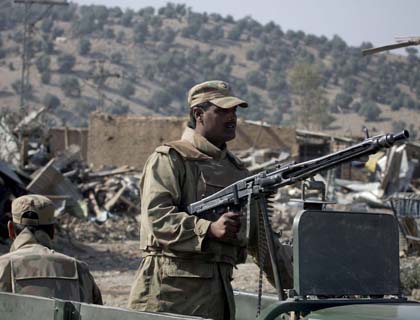According to reports, a gunman opened fire on a passenger bus in the northern Pakistani district of Kohistan on Tuesday, killing 18 people on board. The bus was traveling from Rawalpindi, near the capital Islamabad, to the northern town of Gilgit. It is said that attack held in an area inhabited by two Sunni tribes about 165 km north of Islamabad. Passengers were Pakistan's religious minority Shiites and the incident is viewed largely as sectarian violence.
Along with other religious minorities like Christians, Hindus and etc, Shiites also frequently comes under severe attacks. Meanwhile minorities also have their own groups which frequently act vice versa.
Sectarian and religious violence have been a recurrent feature of Pakistan's history since 1947, both in the form of violent conflict between religious communities, and in the form of one-sided violence against religious minorities. Inter-religious conflicts surfaced as early as in the early 1950s, when religious parties, and in particular the Jamat-e-Islami, called for excluding Ahmadiyya community from Islam. Ahmadis have consistently experienced severe discrimination both from the government and from other Muslim sects. In 1974, the Pakistani parliament declared Ahmadis as non-Muslims, while their religious freedom was further curtailed in 1984 by a highly repressive military ordinance issued by General Zia-ul-Haq
It should be noticed that Shiite and Sunni conflict is indeed a new born incident. They years after partition from India were living peacefully and had no big problem with each other. But the situation did not remain the same two decades after independence of the country, Shiite-Sunni turned tense. The first major incident which fuelled sectarian tension was capture of power by Gen. Zia-ul-Haq, who indeed drew a very bold line between Shiite and Sunni sects. So, the peaceful relations were shattered by Mr. Zia ul-Haq's sectarian Islamization agenda, trying to build system, absolute Shariah-based political establishment.
His sectarian policies divided the society sharply and decades after his regime still the social fabric pre-70s has not been restored. Indeed his policies paved the way for foreign interference as each country had their own religious interests. Regional countries found foothold as religious sects, in order to win over the other, naturally increased fundamentally their ties with neighboring countries. It is not exaggeration if claimed that some religious scholars of regional countries receive homage in level that Pakistani officials and even religious figures dream of.
Shiite and Sunni Madressahs are the center of regional religious influence over the country. These religious institutions have intertwined relation with neighboring countries and extremely revere foreign religious figures.
The policies of Gen. Zia-al-Haq which paved for Gulf countries to exert influence over the religious structure of the country led to a reactionary move from Islamic republic. Shiite community started tightening relation with religious personalities in Islamic Republic of Iran and the process, regretfully, led further to alienation and deepening the gap between two big Islamic sects. The most obvious example is celebration of Quds Day (roz-e-queds) by Shiites in Pakistan which sometimes came under harsh attack by extremists.
Qud's day was found by the founder of Islamic republic of Iran to support Palestine struggle against Israel. So, the day should be celebrated by Sunnis rather by Shiites because Palestinians are Sunni. Though day is celebrated by small Sunni groups in Arab countries, but generally it is celebrated by Shiite in Pakistan and many other countries. Why? Because the Charismatic Iran's Shiite leader and the founder of Islamic republic ordered so. Therefore, the celebrators of the Qud's day not only receive sympathy from Sunni sect but come under attacks. The most example, was the incident of last year in Quetta Pakistan, in which Hazara Shiite celebrators came under severe attack.
Another factor which proved helpful stoking sectarian tension was Taliban regime in Afghanistan. Indeed, sectarian conflict increased tremendously after the Taliban victory in Afghanistan, as a pattern of assassinations of sect leaders and activists emerged. After 1997, mass killings of civilians on a sectarian basis became more frequent. Sectarian violence has involved groups on both sides, including the Shiite group Sipah-e Muhammad Pakistan (the Army of Muhammad) created in 1991. Groups emerged which looked powerful enough that security establishments have not been willing to engage against them, whatever the reason behind. For example, after each attack, this and that groups were out there claiming the responsibilities, but government largely failed to bring into justice the real culprits. (It should be noticed that many of such groups are illegally active in the country).
The anti- Shiite violence has been on the rise, and since the 1990s there has been marked anti- Shiite violence perpetrated armed militant groups. I can remember vividly before 2001 when Taliban regime was on the power, how hard the situation was for Hazara Shiite in Quetta city, the center of Balochistan state. During narrations of Shiite religious scholars, some Sunni religious scholars, sitting out and listening, of course not for learning, but to use their notion as sign of blasphemy and apostate perhaps to justify their attacks.
The extremist armed groups include and Sipah-i Sahaba Pakistan (the Sunni Pakistan's Army of the Prophet's Companions) established in 1985, Lashkar-e-Jhangvi (The Army of Jhangvi – 1990), Tehrik Nifaz Shariat-I Muhammadi (TNSM) and the Lashkar-e-Taiba-1998. Lashkar-e-Jhangvi (LF) is responsible for many anti-Shia attacks including targeted assassinations, shootings and bomb attacks against Shiite communities in Punjab, Karachi and Quetta. Though, with interference of US-led military intervention and outstation of Taliban regime, they generally turned to carry out Jihad Afghanistan, but the attack on passengers on Tuesday and series of other incidents, sectarian violence has not only decreased but on rise. For sure, along with other domestic and foreign challenges for Islamabad, restoration of a friendly community would remain a challenge for the government.

